end和over的用法
英语介词知识总结归纳
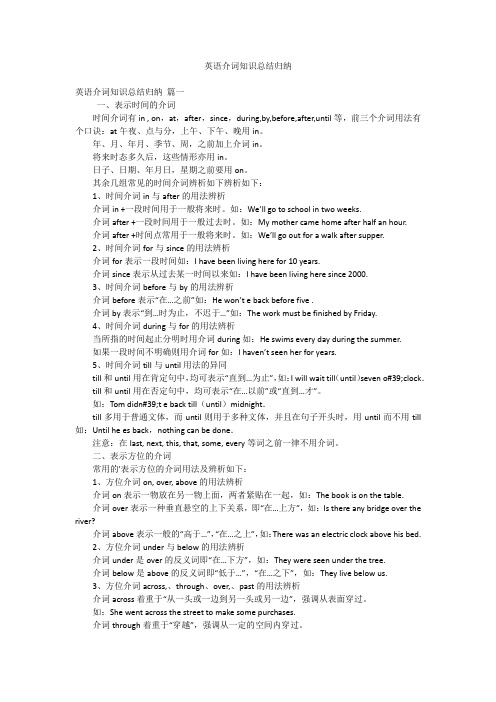
英语介词知识总结归纳英语介词知识总结归纳篇一一、表示时间的介词时间介词有in , on,at,after,since,during,by,before,after,until等,前三个介词用法有个口诀:at午夜、点与分,上午、下午、晚用in。
年、月、年月、季节、周,之前加上介词in。
将来时态多久后,这些情形亦用in。
日子、日期、年月日,星期之前要用on。
其余几组常见的时间介词辨析如下辨析如下:1、时间介词in与after的用法辨析介词in +一段时间用于一般将来时。
如:We’ll go to school in two weeks.介词after +一段时间用于一般过去时。
如:My mother came home after half an hour.介词after +时间点常用于一般将来时。
如:We’ll go out for a walk after supper.2、时间介词for与since的用法辨析介词for表示一段时间如:I have been living here for 10 years.介词since表示从过去某一时间以来如:I have been living here since 2000.3、时间介词before与by的用法辨析介词before表示“在…之前”如:He won’t e back before five .介词by表示“到…时为止,不迟于…”如:The work must be finished by Friday.4、时间介词during与for的用法辨析当所指的时间起止分明时用介词during如:He swims every day during the summer.如果一段时间不明确则用介词for如:I haven’t seen her for years.5、时间介词till与until用法的异同till和until用在肯定句中,均可表示“直到…为止”,如:I will wait till(until)seven o#39;clock.till和until用在否定句中,均可表示“在…以前”或“直到…才”。
初中英语介词用法
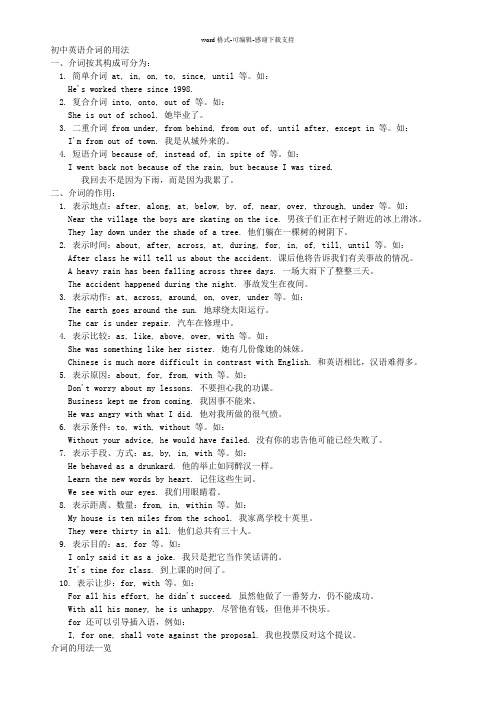
初中英语介词的用法一、介词按其构成可分为:1. 简单介词 at, in, on, to, since, until 等。
如:He's worked there since 1998.2. 复合介词 into, onto, out of 等。
如:She is out of school. 她毕业了。
3. 二重介词 from under, from behind, from out of, until after, except in 等。
如:I'm from out of town. 我是从城外来的。
4. 短语介词 because of, instead of, in spite of 等。
如:I went back not because of the rain, but because I was tired.我回去不是因为下雨,而是因为我累了。
二、介词的作用:1. 表示地点:after, along, at, below, by, of, near, over, through, under 等。
如:Near the village the boys are skating on the ice. 男孩子们正在村子附近的冰上滑冰。
They lay down under the shade of a tree. 他们躺在一棵树的树阴下。
2. 表示时间:about, after, across, at, during, for, in, of, till, until 等。
如:After class he will tell us about the accident. 课后他将告诉我们有关事故的情况。
A heavy rain has been falling across three days. 一场大雨下了整整三天。
The accident happened during the night. 事故发生在夜间。
高考英语一轮复习:介词和介词短语

介词和介词短语(Prepositions)重点用法①介词的种类1.根据形式可以将介词分为简单介词(如in,on,for等)、合成介词(如inside,without等)、双重介词(from behind,from among等)、动词-ing形式的介词(如including,regarding等)和短语介词(如in front of,out of等)。
根据意义可将介词分为表示时间、场所、方向等的介词,介词在句中不能独立做成分。
2.表示时间的介词after在……之后before在……之前around大约……at在……时by到……为止in在……后on在……时till/until直到……3.表示场所、方向的介词across在……对面along沿着……at在……in在……里on在……上above在……上方under/below在……下面beside在……旁边behind在……后面before/in front of在……前面between在……之间among在……之间4.其他介词about关于;对于from从;自从with与……一起;用of……的;属于……的to向;到;对as担任;像;作为for对于;为了;给……besides除了……还有重点用法②表示时间的常用介词辨析用法:1.at表示时刻、时间的某一点;on表示具体的某一天,某一天的上、下午;in表示月、季节、年,泛指上午、下午、晚上(在一段时间内)。
at lunch在午餐时on Monday在周一in January在一月2.before表示“在……之前”;after表示“在……之后”。
I will be back before lunch.午饭之前我赶回来。
The nights start after half past five in winter.冬天的夜晚在5点半之后开始。
3.by表示“在……之前,截止到……”;until/till表示“直到……为止”;by表示到什么时候为止动作已经完成,而until表示动作持续到什么时候,在终止性动词的否定式中,二者通用。
常见表示地点的介词
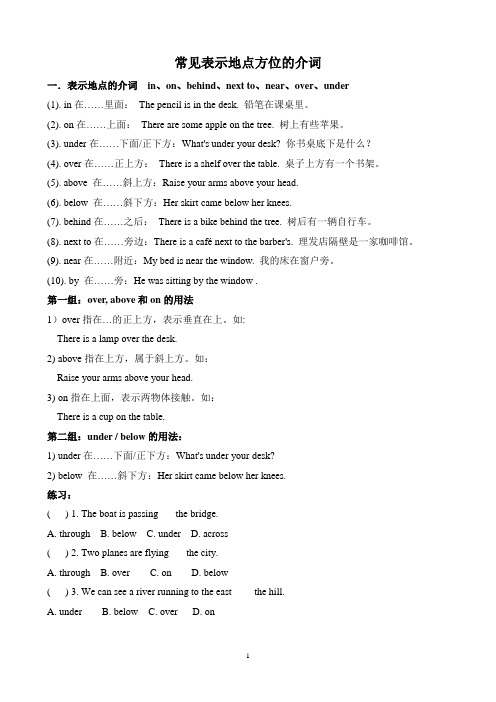
常见表示地点方位的介词一.表示地点的介词in、on、behind、next to、near、over、under(1). in在……里面:The pencil is in the desk. 铅笔在课桌里。
(2). on在……上面:There are some apple on the tree. 树上有些苹果。
(3). under在……下面/正下方:What's under your desk? 你书桌底下是什么?(4). over在……正上方:There is a shelf over the table. 桌子上方有一个书架。
(5). above 在……斜上方:Raise your arms above your head.(6). below 在……斜下方:Her skirt came below her knees.(7). behind在……之后:There is a bike behind the tree. 树后有一辆自行车。
(8). next to在……旁边:There is a café next to the barber's. 理发店隔壁是一家咖啡馆。
(9). near在……附近:My bed is near the window. 我的床在窗户旁。
(10). by 在……旁:He was sitting by the window .第一组:over, above和on的用法1)over指在…的正上方,表示垂直在上。
如:There is a lamp over the desk.2) above指在上方,属于斜上方。
如:Raise your arms above your head.3) on指在上面,表示两物体接触。
如:There is a cup on the table.第二组:under / below的用法:1) under在……下面/正下方:What's under your desk?2) below 在……斜下方:Her skirt came below her knees.练习:( ) 1. The boat is passing___ the bridge.A. throughB. belowC. underD. across( ) 2. Two planes are flying___ the city.A. throughB. overC. onD. below( ) 3. We can see a river running to the east____ the hill.A. underB. belowC. overD. on( ) 4. Do you see the kite ___ the building.A. overB. crossC. onD. aboveC B B D第三组:in 和on表示“在……上”1. 门一类——镶嵌在墙里的,用in,字画一类——挂在墙面上的,用on( ) 1. He put up a map ___ the back wall because there was a hole ___ it.A. on; onB. at; inC. on; inD. on; at( ) 2. There is a door___ the wall.A. onB. toC. ofD.in( ) 3. Any man ___ eyes______ his head can see that he's exactly like a rope.A. with; onB. with; inC. on; withD. in; with2. 鸟一类落在树上的,用in;苹果一类长在树上的,用on( ) 1. There are some birds singing___ the trees.A. inB. onC. atD. from( ) 2. There are so many apples___ that tree.A. inB. onC. atD. from第四组:in /on/ to表示“接壤”B A B A B AB 在A里—用in A和B相邻(接壤)—用on A和B不相邻(不接壤)—用to ( ) 1. The United States is ____ the south of Canada and ___ the east of Japan.A. to; inB. on; toC. in; besideD. at; on( ) 2. The man stood____the window, watching the boys playing outside.A. inB. byC. withD. to( ) 3. Japan lies____ the east of China.A. onB. toC. inD. with第五组:at, in表示“在……”1) at表示较小的地点。
介词的用法归纳 介词后面跟什么
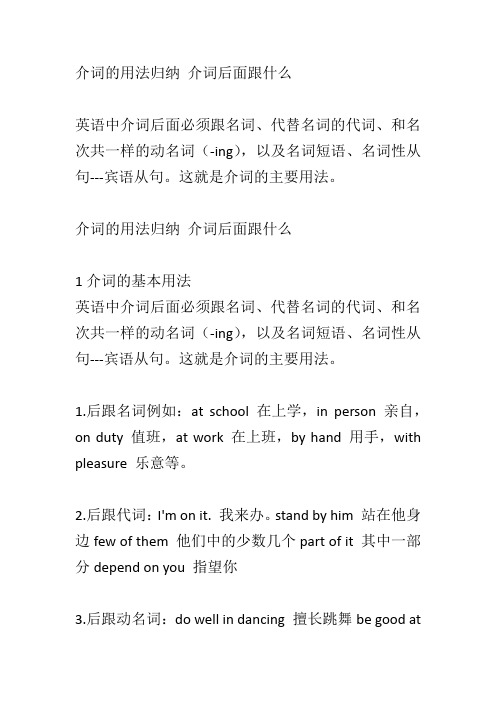
介词的用法归纳介词后面跟什么英语中介词后面必须跟名词、代替名词的代词、和名次共一样的动名词(-ing),以及名词短语、名词性从句---宾语从句。
这就是介词的主要用法。
介词的用法归纳介词后面跟什么1介词的基本用法英语中介词后面必须跟名词、代替名词的代词、和名次共一样的动名词(-ing),以及名词短语、名词性从句---宾语从句。
这就是介词的主要用法。
1.后跟名词例如:at school 在上学,in person 亲自,on duty 值班,at work 在上班,by hand 用手,with pleasure 乐意等。
2.后跟代词:I'm on it. 我来办。
stand by him 站在他身边few of them 他们中的少数几个part of it 其中一部分depend on you 指望你3.后跟动名词:do well in dancing 擅长跳舞be good atswimming 擅长游泳how about going traveling 去旅行怎么样be fond of cycling 酷爱骑行2英语介词怎么用⑴时间或地点介词in、on、at的用法区别:表示时间时, in表示在一段时间里(在将来时句子中则表示在一段时间之后), on表示在具体的某一天或者某天的上下午等, at表示在某个时刻或者瞬间;表示地点时, in 表示在某个范围之内, on表示在某个平面上或与一个面相接触,at则表示在某个具体的场所或地点.如:He was born on the morning of May 10th.(他出生于五月十日的早晨)/ I usually get up at 7:00 in the morning.(我通常在早上的七点钟起床) / His glasses are right on his nose.(他的眼镜就架在他的鼻子上)/ He is at the cinema at the moment.(此刻他正在电影院)⑵after与in表示时间的用法区别:“after+(具体时刻/从句)”表示“在…时刻之后”常用于一般时态;“in+(一段时间)”表示“在(多久) 之后”,常用于将来时态.如:He said that he would be here after 6:00.(他说他六点钟之后会来这儿)/ My father is coming back from England in about a month.(我父亲大约一个月以后从英国回来)⑶since与for表示时间的用法区别:“since+(具体时刻/that-从句)”表示“自从…起一直到现在”,“for +(一段斶间)”表示“总共有…之久”,都常用于完成时态;如:Uncle Li has worked in this factory since 1970.(李叔叔自从1970年起就在这家工厂工作了)/ Uncle Li has worked in this factory for over 30 years. (李叔叔在这家工厂已经工作了30多年)⑷by、in与with表示方式的用法区别:都可以表示“工具、手段”,但是by主要表示“乘坐”某个交通工具或“以……方式”,在被动句中可以表示动作的执行者;in表示“使用”某种语言/文字,with表示“使用”某个具体的工具、手段.如:We see with our eyes and walk with our feet.(我们用眼睛看东西,用双脚走路)/ Please write that article(文章) in English.(请你用英语写那篇文章)/ Let’s go to the zoo by taxi.(我们打的去动物园吧.)/ It was written by Lao She.(那是老舍写的)⑸about与on的用法区别:都可以表示“有关…”,但是about的意义比较广,而on主要表示“有关…(专题/课程)”.如:Tom is going to give a talk on the history of America.(汤姆要作一个美国历史的报告)/ They are very excited talking about the coming field trip.(他们兴致勃勃地谈论着即将来到的野外旅游)⑹through与across、over的用法区别:through指“穿过…(门洞/人群/树林)”;across和over可以指“跨越…(街道/河流)”,可互换,但是表示“翻过…”时只能用over. 如:Just then a rat (鼠)ran across the road.(就在那时一只老鼠跑过路面)/ There is a bridge across/over the river.(河上有座桥)/ They climbed over the mountain and arrived there ahead of time.(他们翻过大山提前到达了那里)/ The visitors went through a big gate into another park.(参观者们穿过一个大门来到另一个公园)(7)as与like的区别:两个词都表示“像……”,但是as译为“作为……”,表示的是职业、职务、作用等事实,而like译为“像……一样”,表示外表,不是事实.如:Let me speak to you as a father.(我以父亲的身份和你讲话.)(说话者是听者的父亲) / Let me speak to you like a father.(让我像一位父亲一样和你讲话)(说话者不是听者的父亲)(8)at the end of、by the end of、to the end、in the end 的用法区别:at the end of…既可以表示时间也可以表示地点,译为“在…末;在…尽头”,常与过去时连用;by the end of…只能表示时间,译为“在…前;到…为止”,常用于过去完成时;in the end与at last基本等义,表示“终于、最后”,通常用于过去时;to the end 译为“到…的终点为止”,前面往往有表示运动或连续性的动词.如:By the end of last term we had learned 16 units of Book III.(到上学期期末我们已经学习了第三册16个单元)/ At the end of the road you can find a big white house with brown windows.(在路的尽头你能找到一幢有棕色窗户的白房子)/ They left for Beijing at the end of last week.(上周末他们动身去了北京)/ In the end he succeeded in the final exams.(他最终在期末考试中考及格了)/ We should go on with the work to the end.(我们应该把工作干到底)/ Follow this road to the end and you will see a post office.(沿这条路走到底就能看见一家邮电局)(9)for a moment、for the moment、in a moment、at themoment的区别:for a moment“一会儿、片刻”(=for a while),常与持续性动词连用;for the moment“暂时、目前”,常用于现在时;in a moment“一会儿、立即、马上”(=soon; in a few minutes),一般用于将来时;at the moment“此刻,眼下”(=now),用于现在进行时.如:Please wait for a moment.(请稍等)/ Let’s leave things as they are for the moment.(暂时就维持现状吧!) / I’ll come back in a moment.(我过会儿回来)/ I am very busy at the moment.(眼下我很忙)(10)but的问题:用介词but引出另一个动词时,要注意:如果前面有do,后面就用原形动词,前面没有do时,后面的动词要加to.如:I could do nothing but wait.(我什么也做不了只能等) / They had no choice(选择) but to fight.(他们没有选择只有战斗)(11)in front of 与in the front of:in front of“在…的前面”, 与in the front of“在…的前部”.如:A car was parking in front of the hall.(大厅跟前停着一辆汽车)/ In the front of the hall stood a big desk.(大厅前部立着一个大讲台)(12)except (for)与besides的区别:except“除了”,表示排除掉某人物,即不包含;而besides“除了”则表示包含,即“不仅……又……”.如:Everyone went to the Palace Museum except Tom.(除了Tom,大家都去了故宫博物院)(Tom没有去故宫)/ Besides Chinese he also studied many other subjects.(除了汉语之外,他还学其他许多功课)(“汉语”也是他学的功课之一)other than 除了.之外. There 're nobody here other than me 与.不同. 与.不同方式.we can't get there other than by swimming.Apart from : with the exception of ...; besides... Apart form a few scratches, the car was undamaged。
bythetime和bytheendof的区别
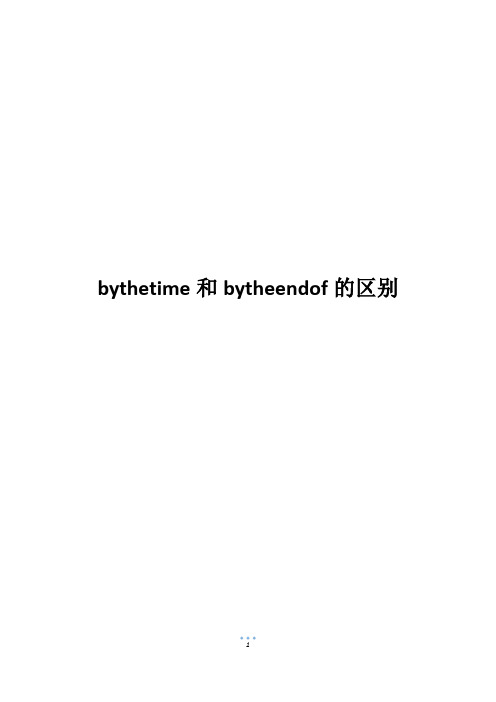
bythetime和bytheendof的区别by the time和by the end of的区别:中文含义及用法不同。
当by the time表示将来的时间,主句用将来完成时,从句用一般现在时来表示将来的动作;by the end of多指时间,常用于完成时态,也可用于将来时态。
一、by the time的中文意思及用法介绍by the time意为到……的时候。
可以表示将来的时间,其主句用将来完成时,从句用一般现在时来表示将来的动作;也可表示过去的时间,其主句用过去完成时,从句用一般过去时。
例句:By the time you get there the meeting will be over.等你到了那里的时候,会议就该结束了。
By the time I arrived on the scene, it was all over.我来到现场时,一切都已结束。
She was tired and out of sorts by the time she arrived home.她回到家里,又累又烦。
By the time we arrived, someone had grabbed all the good seats.我们到达时,所有的好位子都给人占了。
By the time he'd fixed the leak, I was into him for$ 500.他补好漏洞时,我就该付给他500元。
By the time I get home, I'm too tired to do anything active 我到家时累得无法动弹。
By the time we had made landfall the boat looked ten years older!等到我们登陆时,这艘船看似已老了10年!二、by the end of的中文意思及用法介绍by the end of意为在……尽头。
英语中所有动词短语和短语动词 Microsoft Word 文档
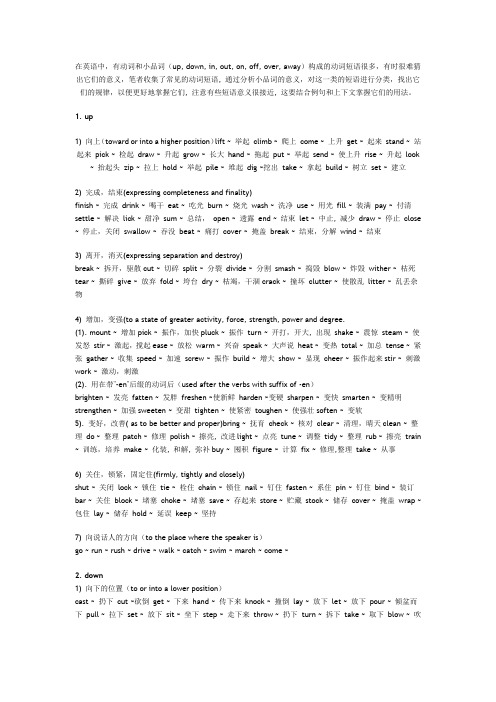
在英语中,有动词和小品词(up, down, in, out, on, off, over, away)构成的动词短语很多,有时很难猜出它们的意义,笔者收集了常见的动词短语, 通过分析小品词的意义,对这一类的短语进行分类,找出它们的规律,以便更好地掌握它们, 注意有些短语意义很接近, 这要结合例句和上下文掌握它们的用法。
1. up1) 向上(toward or into a higher position)lift ~ 举起climb ~ 爬上come ~ 上升get ~ 起来stand ~ 站起来pick ~ 检起draw ~ 升起grow ~ 长大hand ~ 拖起put ~ 举起send ~ 使上升rise ~ 升起look ~ 抬起头zip ~ 拉上hold ~ 举起pile ~ 堆起dig ~挖出take ~ 拿起build ~ 树立set ~ 建立2) 完成,结束(expressing completeness and finality)finish ~ 完成drink ~ 喝干eat ~ 吃光burn ~ 烧光wash ~ 洗净use ~ 用光fill ~ 装满pay ~ 付清settle ~ 解决lick ~ 甜净sum ~ 总结,open ~ 透露end ~ 结束let ~ 中止, 减少draw ~ 停止close ~ 停止,关闭swallow ~ 吞没beat ~ 痛打 cover ~ 掩盖break ~ 结束,分解wind ~ 结束3) 离开,消灭(expressing separation and destroy)break ~ 拆开,驱散cut ~ 切碎split ~ 分裂divide ~ 分割smash ~ 捣毁blow ~ 炸毁wither ~ 枯死tear ~ 撕碎give ~ 放弃fold ~ 垮台dry ~ 枯竭,干涸crack ~ 撞坏 clutter ~ 使散乱litter ~ 乱丢杂物4) 增加,变强(to a state of greater activity, force, strength, power and degree.(1). mount ~ 增加pick ~ 振作,加快pluck ~ 振作turn ~ 开打,开大, 出现shake ~ 震惊steam ~ 使发怒stir ~ 激起,搅起ease ~ 放松warm ~ 兴奋speak ~ 大声说heat ~ 变热total ~ 加总tense ~ 紧张gather ~ 收集speed ~ 加速screw ~ 振作build ~ 增大show ~ 显现 cheer ~ 振作起来stir ~ 刺激work ~ 激动,刺激(2). 用在带"-en"后缀的动词后(used after the verbs with suffix of -en)brighten ~ 发亮fatten ~ 发胖freshen ~使新鲜harden ~变硬sharpen ~ 变快smarten ~ 变精明strengthen ~ 加强sweeten ~ 变甜tighten ~ 使紧密toughen ~ 使强壮soften ~ 变软5). 变好,改善( as to be better and proper)bring ~ 抚育check ~ 核对clear ~ 清理,晴天clean ~ 整理do ~ 整理patch ~ 修理polish ~ 擦亮, 改进light ~ 点亮tune ~ 调整tidy ~ 整理rub ~ 擦亮train ~ 训练,培养make ~ 化装, 和解, 弥补buy ~ 囤积figure ~ 计算fix ~ 修理,整理take ~ 从事6) 关住,锁紧,固定住(firmly, tightly and closely)shut ~ 关闭lock ~ 锁住tie ~ 栓住 chain ~ 锁住nail ~ 钉住fasten ~ 系住pin ~ 钉住bind ~ 装订bar ~ 关住block ~ 堵塞choke ~ 堵塞save ~ 存起来store ~ 贮藏stock ~ 储存cover ~ 掩盖wrap ~ 包住lay ~ 储存hold ~ 延误keep ~ 坚持7) 向说话人的方向(to the place where the speaker is)go ~ run ~ rush ~ drive ~ walk ~ catch ~ swim ~ march ~ come ~2. down1) 向下的位置(to or into a lower position)cast ~ 扔下cut ~砍倒get ~ 下来hand ~ 传下来knock ~ 撞倒lay ~ 放下let ~ 放下pour ~ 倾盆而下pull ~ 拉下set ~ 放下sit ~ 坐下step ~ 走下来throw ~ 扔下turn ~ 拆下take ~ 取下blow ~ 吹倒bring ~ 打倒hang ~ 垂下sink ~ 沉落slip ~ 失足squat ~ 蹲下swallow ~ 吞下stoop ~ 伏身splash ~ 飞溅而下touch ~ 降落bend ~ 弯下bow ~ 鞠躬kneel ~ 跪下lie ~ 躺下strip ~ 脱下2) 减少(强度,量和体积)(a decrease in intensity, amount, bulk)dwindle ~ 减少die ~ 变弱,逐渐停止go ~ 平静下来mark ~ 削减hold ~ 压低burn ~ (火)减弱, 烧坏slow ~ 慢下来burn ~ 烧掉wash ~ 冲淡 clean ~ 弄干净rub ~ 擦干净bring ~ 降低keep ~ 缩减trim ~ 裁减water ~ 冲淡thin ~ 减少run ~ 用光衰弱wear ~ 削减,磨损come ~ 下跌knock ~ 降价3) 停止,减弱(to a state of less activity, force, strength and power)close ~ 关闭drop ~ 突然停止break ~ 坏了,中止run ~ 停止settle ~ 平静下来 cool ~ 冷静下来turn ~ 拒绝die ~ 停止lay ~ 失望put ~ 镇压4) 紧紧地,牢牢地(firmly, tightly) fasten ~ 系牢 chain ~ 链住,栓住clamp ~ 夹住nail ~ 钉住pin ~ 扣牢hammer ~ 钉上tie ~ 栓住bind ~ 捆绑draw ~ 停下来5) 写下,记下(on paper or in writing) write ~ 写下copy ~ 抄下note ~ 记下take ~ 记下put ~ 记下get ~ 记下have ~ 写下3 on1) 继续(continuously)carry ~ drive ~ fight ~ hold ~ keep ~ live ~ sleep ~ sing ~ walk ~ go ~ hurry ~ move ~ read ~ follow ~ struggle ~ insist ~ 坚持2) 连上,固定住,(in or into a state of being connected)act ~ 对…起作用catch ~ 抓牢 come ~ 跟随count ~ 依赖draw ~ 带上,穿上fasten ~ 纠缠,抓牢fit ~ 固定get ~ 接近paste ~ 粘住turn ~ 打开switch ~ 打开pin ~ 钉住put ~ 穿上try ~ 试穿pull ~ 穿上hang ~ 不挂断build ~ 建立于leave ~ 留住take ~ 穿下rely ~ 依靠depend ~ 依靠3) 向前,向上(forward, onward)add ~ 加上mark ~ 标上paint ~ 漆上press ~ 向前pass ~ 传递send ~ 转送stamp ~ 盖章于get ~ 上车hand ~ 传送4) 开始某活动(in or into an active operation)work ~ 从事fall ~ 攻击hit ~ 突然向起bring ~ 引起get ~ 取得进展look ~ 旁观, 观看call ~ 拜访figure ~ 打算,希望fix ~ 决心get ~ 进步, 友好相处pick ~ 批评plan ~ 打算decide ~ 决定reflect ~ 思考, 反思remark ~ 评论,议论settle ~ 决定spur ~ 鼓励urge ~ 督促4. off1) 离开(indicating departure)blow ~ 吹掉drive ~ 击退get ~ 下车,动身lift ~ 离开地面make ~ 逃走move ~ 离去pack ~ 打发走see ~ 送行ship ~ 运往start ~ 动身send ~ 送行,解雇call ~ 叫走let ~ 放出take ~ 起飞touch ~ 发射give ~ 发出clear ~ 走开carry ~ 夺走2) 去掉,断开(indicating removal or disconnection)cut ~ 切断tear ~ 扯掉take ~ 拿走 chip ~ 切下come ~ 脱落 cross ~ 除去drop ~ 跌落fall ~ 脱落flick ~ 弹掉peel ~ 剥掉pull ~ 撕开rub ~ 擦掉scrape ~ 挂去shave ~ 剃去wash ~ 洗掉shake ~ 抖落throw ~ 扔开rip ~ 扯开turn ~ 关掉strip ~ 脱去switch ~ 关掉take ~ 脱掉shut ~ 关掉wear ~磨损go ~ 爆炸break ~ 中断3) 完成,停止(indicating completion)finish ~ 结束pay ~ 付清break ~ 停止,中断send ~ 结束leave ~ 停止pass ~ 终止,停止sign ~ 停止播音wear ~ 消失,write ~ 注销,购销bring ~ 完成 call ~ 取消lay ~ 停止, 解雇4) 着地(down to the ground)fall ~ 落下ju mp ~ 跳下knock ~ 击倒slip ~ 滑倒5. in1) 进入,向里(into, inside, indoors)barge ~ 闯入beat ~ 打进break ~ 闯入,插嘴breathe ~ 吸入burst ~ 闯入,打断drop ~ 偶然拜访fall ~ 跌入get ~ 插入,收进knock ~ 打入lead ~ 导入let ~ 进入,嵌入move ~ 迁入step ~ 走进settle ~ 迁入smuggle ~ 偷偷运进cut ~ 插嘴call ~ 来访draw ~ (火车)进站intervene ~ 介入involve ~ 卷入2) 包围,关闭(to be surrounded, or enclosed)close ~ 包围,封闭lock ~ 禁闭shut ~ 关进wall ~ 围住3) 加入,记入(to be added, or included)book ~ 登记check ~ 签到 count ~ 记入fill ~ 填入hand ~ 交上take ~ 吸收send ~ 呈交6. out1) 向外(away from the inside, outside)keep ~ 使在外take ~ 拿出put ~ 放出,伸出come ~ 长出,bring ~拿出bar ~关在外breathe ~ 呼吸出eat ~ 出去吃get ~ 弄出go ~ 出去lay ~ 摆开,展示lock ~ 关在外面look ~ 向外看move ~ 搬出point ~指出pour ~ 诉说pull ~ 拉出ship ~ 运出stick ~伸出spit ~ 吐出beat ~ 敲出knock ~ 敲出dine ~ 外出吃饭drive ~ 驾车外出leak ~ 漏出draw ~ 拉出see ~ 送出门去draw ~ 出站let ~ 放出, 释放2) 结束,消失,取消(to or at an end, not to be there or not to exist)burn ~ 烧尽,烧断clear ~ 清除dust ~ 清除fade ~ 消失put ~ 扑灭run ~ 用完 use ~ 耗尽give ~ 耗尽comb ~ 淘汰kick ~ 逐出wipe ~ 消灭die ~ 灭绝rub ~ 擦掉blot ~ 除去blow ~ 吹熄bleach ~ 漂白carry ~ 完成,执行leave ~ 省去see ~ 完成go ~ 熄灭 come ~ 罢工,结果cut ~ 删去,停止hold ~ 坚持到底sell ~ 买完tire ~ 筋疲力尽wear ~ 磨损3) 大声(in a loud voice, aloud)sing ~ cry ~ shout ~ call ~ ,喊,申斥spell ~ speak ~ scream ~ read ~ yell ~ sob ~ burst ~ 咆哮4) 分发,传开(to a number of people or in all directions)give ~ 分发spread ~ 传开set ~ 出发hand ~ 分发share ~ 分配divide ~ 分配call ~ 出动start ~ 出发send ~ 发送break ~ 爆发,逃脱serve ~ 分发口粮drop ~ 离开,退出5) 搞清,弄明白(in or into notice and clearness)find ~ 找出figure ~ 算出,解决make ~ 弄清count ~ 点清come ~ 出版,出现catch ~ 看出 carry ~ 完成,bear ~ 证明bring ~ 发表,说出fill ~ 使完全, 添满write ~ 写出7. over1) 向下(downwards from an upright position)knock ~ 撞倒turn ~ 翻转fall ~ 脸朝下跌倒trip ~ 拌倒bend ~ 伏身look ~ 从…上面看2) 自始至终,通过, 重复(from beginning to end, through, again and again)look ~ 调查think ~ 考虑see ~ 查看run ~ 匆匆看talk ~ 商量call ~ 点名read ~ 读一遍go ~ 复习do ~ 重复glance ~ 浏览skip ~ 略过ponder ~ 思考3) 向上,向外,(indicating motion upwards or outwards)run ~ 溢出spill ~ 溢出boil ~ 因沸溢出throw ~ 呕吐所有短语动词look out (for)小心watch out (for)小心wear(sb)out 使疲劳;劳累leave out 省去;遗漏;忽略work out(well)很成功;结果是好的turn out 生产;证明是put out 扑灭;生产;出版;赶走take out 拿出pull out 拉出;掏出;拔出;抽出;取出;(车,船)驶出pick out 选出;领会;弄明白pay out 付出;得到报应make out 看清;理解;断定keep out 把…挡在外边hold out 伸出;支撑;提出hand out 分发;施舍go out (灯、火)熄灭;(年、月)结束;(衣着)过时;倒塌;罢工carry out (the plan / the policy)实施;执行break out 爆发give out 发出(气味、热)等;分发;耗尽;疲劳check out 结账离开call out 大声叫喊drop out 辍学;掉落come out 出来;花开放;出版;得…名次get out (使)出去;逃脱;(消息等)泄露;说出;公布think out 想出let out 泄漏(机密);发出(喊叫)point out 指出blow up 告吹;发脾气;(风雨)等发生break up 破碎;结束;(士气)衰弱;(关系)破裂bring up 培养;养育;呕吐call up 给…打电话;使人想起come up 走近;发芽;提出来;出现(问题;建议);上楼cover up 掩盖;包庇cut up 切碎;使…难过get up 起床;起立;(风、浪、火)大起来;打扮;安排;组织check up=check through=check over 核对;检查give up 放弃;把…送交;使埋头于…go up 上升;涨价;修建;增长hang up / off 挂起;挂断电话hold up 举起;竖起;支撑;使停顿;使延误keep up 保持;继续(某活动)look up 抬头看;查阅;看望;(身体)好转make up 弥补;赔偿;编造;组成;虚构pull up 拔出;拔掉;使车停住;停车pick up 举起;拾起;(身体)好转;中途接入;(非正式)学会;偶然发现/买到/得知/养成习惯等wind up 上紧(钟表)发条;使紧张;兴奋;结束put up 举起;盖起;支起;张贴;投宿shut up 关门;关在里面;闭嘴show up=turn up 露面take up 着手;占有(时间,空间)turn up 出现;放大(灯光,收音机,煤气等)work up 激发(情感)wrap up 席卷而去;包起来think up 想出use up 用完make up 化妆;编造save up 节省eat up 吃光stay up / sit up 熬夜不睡觉light up 照亮;(脸上)呈现高兴的情绪look up 抬头看;查找;好转blow off 吹掉;埋怨;炸掉break off 突然中断;停止;与…断绝关系call off 叫走;取消carry off 夺走;抢走;获得奖品;叼走come off 脱落;举行;结果cut off 切下;剪下;切断cross off/out 勾掉;划掉die off 相继死去fall off 跌落;减少;脱落;衰退knock off 撞落;撞倒get off 下来;下车;脱下(衣服);(飞机)起飞give off 发出;放出go off (to…)熄灭;动身去某地;炸锅hang off / back 忧郁;畏缩hold off 推迟;抵挡;不使…接近keep off 避开;防止;挡住leave off 停止;中断pay off 还清;偿还掉put off 推迟;延期shut off 关掉;切断电源take off 脱下;起飞turn off 关掉;切断;取消wipe off 擦掉;还清(债务)blow down 吹倒;吹落break down 出故障;失败;崩溃;分解bring down 使下降;使泄气come down 下来;下降cut down 减少开支;砍倒die down (风、雨、火、植物,浪)平息fall down 落下;跌到;倒塌;失败;证明是不行的go down (价格)下降;(日、月)落下;(风、浪)平静;(船)下沉;倒闭hand down 递给;传递下来;世代相传hold down 制止;控制;缩减put down 写下;记下;镇压;放下shut down (指工厂)关闭;停工take down 记下来;取下来;拆除;咽下turn down 拒绝;关小;调低let sb down 使… 失望bring about 导致;产生;发生come about 产生;造成hang about/around 闲逛;逗留;徘徊check over 核对;检查come over 走过来take over 接管;接替;继承think over 仔细考虑;思考一下turn over 翻开;翻身;移交go over 越过;细看;复习;转向;被翻倒get over 爬过(山、墙);克服(困难、偏见)熬过;从…恢复过来;做完;浏览look over one‘s shoulder 看过去roll over 翻滚;翻身fall over 绊了一跤take away 拿走get away (from)逃脱;离开;出发;把…送走;寄走blow away 吹走;吹散break away from 脱离(政党)等;放弃;打破(陈规)carry away 运走;使失去自制力die away (风、声音)减弱give away 分发;赠送;出卖;放弃(机会)等go away 走开;离去;(岁月)流逝;死去keep away from… 使避开;使远离pass away 去世;消失;度过put away 把…收起来;存好;放置暂时不用run away 逃走;携带…逃走fade away 褪色;慢慢褪去wash away 洗掉;(洪水)冲垮stay away from 离… 远点shy away from 退出;躲避bring back 拿回;使…回想起call back / ring back 回电话turn back 回来get back 回来;恢复;要回;带回fight back 反击put back 放回原处;拨回时钟;延期推迟take back 收回kick back 踢回pay back 偿还write back 回信give back 归还;送回;恢复;后退come back to life 恢复健康look back on… 回忆;回顾throw back 扔回去draw back 后退其他常用词组(to为介词)object to 反对attend to 办理;处理;注意听;照顾look forward to 期待;盼望be opposed to 反对devote… to 贡献给…stick to 坚持lead to 导致pay attention to 注意到be related to 与…有关be limited to 限制到…be applied to 应用于…see to 注意做到;务必做到;负责… refer to 提到;指的是turn to 翻到;求助于。
英语中考归纳复习专题:介词
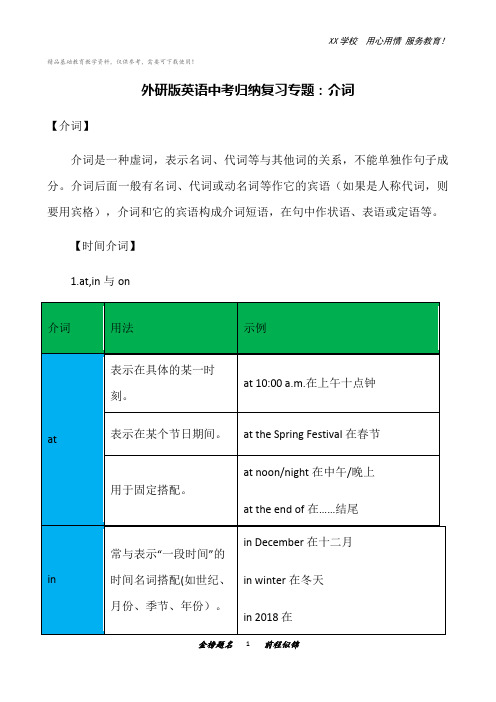
精品基础教育教学资料,仅供参考,需要可下载使用!外研版英语中考归纳复习专题:介词【介词】介词是一种虚词,表示名词、代词等与其他词的关系,不能单独作句子成分。
介词后面一般有名词、代词或动名词等作它的宾语(如果是人称代词,则要用宾格),介词和它的宾语构成介词短语,在句中作状语、表语或定语等。
【时间介词】1.at,in与on2.from,since与for3.before与after4.until,during与by【考点训练1】1.China successfully hosted the Belt and Road Forum _____ May,2017. ()A.onB.inC.byD.at2.We usually have the first class ___ 8:00 in the morning. ()A.inB.onC.atD.from3.More and more young people go skating _____ winter. ()A.atB.inC.onD.to4.I’ve had this mobile phone ___ three years. ()A.byB.fromC.forD.since5.His grandfather has been ill ___ last year. ()A.forB.sinceC.fromD.after6.___ April 22nd,people around the world celebrate Earth Day in different ways.()A.InB.AtC.OnD.For【方位介词】1.at与in2.in,on与to【图解助记】3.over,above,on,under与below 介词含义例句over 在……正上方(垂直,两者不接触)There is a bridge over the river.河上有一座桥。
- 1、下载文档前请自行甄别文档内容的完整性,平台不提供额外的编辑、内容补充、找答案等附加服务。
- 2、"仅部分预览"的文档,不可在线预览部分如存在完整性等问题,可反馈申请退款(可完整预览的文档不适用该条件!)。
- 3、如文档侵犯您的权益,请联系客服反馈,我们会尽快为您处理(人工客服工作时间:9:00-18:30)。
end和over的用法
1. en d的基本用法
在英语中,e nd作为一个常见的动词和名词使用。
作为动词,e n d的
主要含义是“结束”或“终结”。
它可以用于不同的情境中,表示结束某种活动、时期或状态。
作为名词,e n d通常表示末尾、目标、目的或结果。
使用示例:
-T he me et in gw il len d at4p m.(会议将在下午4点结束。
)
-I t'st im et oe nd the r el at io ns hi p.(是时候结束这段关系了。
)
-H et ri ed hi sb es tto a ch ie ve ah ap py end.(他尽力去获得一个幸福
的结局。
)
2. ov er的基本用法
同样是常见的动词和名词,o ve r在英语中表示“结束”、“完成”或“超越”等含义。
作为动词,ov er的主要含义是“结束”或“完成”,
通常用于描述一个行动或过程的结束。
作为名词,ov er可以表示超越、
透过、结束或完成。
使用示例:
-P le as em ak es ur eth e pr oj ec ti so ve rby F ri da y.(请确保项目在星
期五之前完成。
)
-T he st or mi sf in all y ov e r.(风暴终于结束了。
)
-S he wa sa bl et og eto v er he rf ea ro ff lyi n g.(她终于克服了对飞行
的恐惧。
)
3. en d和o v e r的区别和用法示例
虽然en d和ov e r都表示“结束”,但它们在使用时有一些区别。
下
面是一些示例来帮助理解它们的不同用法:
3.1.e n d和o v er 都表示结束,但是用法不同
-T he mo vi ew il le nda t9p m.(电影将在晚上9点结束。
)
-T he ga me is ov er.(比赛结束了。
)
3.2.e n d强调到达最终点,o v e r强调完成或超越
-W ef in al ly re ac hed t he en do ft he ro ad.(我们终于到达了路的尽头。
)
-
S h ea ch ie ve dg re ats u cc es sa nd we nt ove r ev er yo ne's ex pec t at io ns.(她取得了巨大的成功,超越了每个人的期望。
)
3.3.e n d强调结果,o v e r强调超越
-T hi sd ec is io nw ill d et er mi ne th ee ndo f ou rf ri en ds hi p.(这个决定将决定我们友谊的终结。
)
-H ew an ts to pr ov eth a th ec an ov er hi spr e vi o u sr ec or ds.(他想证明自己可以超越以往的记录。
)
4.总结
在英语中,e nd和ov e r是常见的词汇,都表示“结束”。
然而,它们在用法和含义上有一些区别。
en d强调的是结束和终结,可以用作动词或名词,指的是某事物的终点或终止状态。
o v er强调的是完成、超越或超出,也可以用作动词或名词。
它们的具体用法要根据上下文来确定。
了解这些用法将有助于更准确地运用这两个词汇,表达自己的意思。
